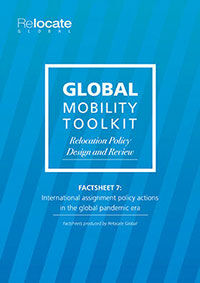Focusing on the family: Policy issues in the COVID-19 era
As the Covid-19 pandemic enters its third wave, many expatriate families are looking to repatriate when they can but there are still international relocations being planned which involve outbound family mobility. Educational, dual career, well-being and adjustment training issues remain significant to the success of global relocation exercises as well as to effective repatriation. Dr Sue Shortland examines global mobility policy actions in the context of the pandemic.

Global Mobility Challenges
Given the scale of the global pandemic, it is unsurprising that global mobility professionals identify their main challenges over the next two years as related to managing new types of mobility (such as virtual assignments), compliance requirements (immigration and tax) and health and medical care. According to Santa Fe Relocation’s latest survey (Repurpose: Challenging Change, 2020) spousal career issues, family issues such as aging parents, and lack of suitable education provision do still feature as challenges but they fall towards the lower end of a long list. This might be because of the increasingly sophisticated global, regional and local supply chains available today which can supply niche services and drive greater employee and family satisfaction. For example, cultural and language preparatory training which can aid family adjustment can be tailored effectively to meet both organisational and individual family members’ needs and preferences. Pre-assignment visits and school finding support for families on the move can be offered through blended online and physical support.Watch all of Dr Sue Shortland's most recent webinars:
Educational Needs
For families moving abroad, education remains the top priority. Global mobility policies typically provide for school search and enrolment assistance. Pre-pandemicthis was usually combined with a home search pre- assignment trip. During the pandemic, schools have adapted their advisory and information services to ensure that parents can still be supported, but virtually. School search consultants also can operate virtually with niche consultancies able to locate appropriate schooling for children with a range of special needs. So, although in-person parental visits are likely to be reduced, much of the initial screening can be carried out remotely. For example, international schools provide videos and virtual tours, webinars and online Q & A sessions. Schools and universities are hosting open days virtually which will help families to make educational choices without the need to visit in person.Related:
It is also possible for parents, employers and relocation professionals to attend online webinar events such as Relocate Global’s Great International Education and Schools’ Fair. Such events enable a comparison of a wide range of educational options and access to experts in the field. Schools directories such as those published by Relocate Global can also prove invaluable to understanding the range of educational possibilities available.A further point to remember is that children’s education also needs to be considered for those families repatriating. Returning home can be a shock and children can be unhappy as they have to make new friends and try to adjust to enrolment in a state school after being in an international school. Education consultancies can help with the process of reintegration. Educational tutors can also be of assistance outbound and homeward bound to bridge gaps where curricula do not exactly align.
Download the Factsheet: Relocation Policy Design and Review: International assignment policy actions in the global pandemic era to find out more about:
- International assignment types – options and trends
- Virtual assignments and remote working
- Cultural competence
- The employee experience, business flexibility and core-flex solutions
- Employee and family support and duty of care
- Compliance issues
- Further reading
Dual Careers
Dual career issues have always been a potential barrier to geographic mobility. As many organisations slim down their workforces in response to reduced consumer demand in certain sectors so there is the potential that employment opportunities for accompanying partners will reduce. Emphasis on dual career support including career counselling therefore remains a critical part of the mobility package.A further area concerns career prospects for repatriating couples. As more assignees and their families repatriate but as job opportunities decline in the home country for returning partners, relocation policy might be extended to offer career counselling support for partners on repatriation.Health and Medical Care
The health and well-being of employees and their family members are an immediate priority for organisations involved in global mobility. This has always been the case but this issue has taken on increased significance in the pandemic. Employers have a duty of care to ensure that assignees and any accompanying family are able to access healthcare and emergency services. It is therefore vital to ensure that emergency evacuation, health insurance and hospital access are available and that there is provision made for addressing Covid-19 health issues as far as is practicable.It is vital to communicate clearly with employees and their families to explain the nature of cover and access available to them when they relocating to a new host country so that they are able to make informed decisions as to the implications of undertaking a family accompanied assignment. If assignees are relocating alone and leaving family members behind, again clear information must be provided as to how employee health and well-being will be managed, including how emergency returns will be handled should there be family emergencies back home.As explained in our factsheet on international assignment policy actions in the global pandemic era, as quarantine restrictions are brought into force, relaxed and re-imposed as the disease spreads, is contained, and then spikes again, careful and on-going attention needs to be paid to government advice with respect to when to undertake only essential travel as well as any quarantine restrictions on entering or returning from a different country.A further point to remember is that remote working can also require attention to be paid to health issues especially when the assignee is based in a third country as opposed to the home or host countries and is undertaking business travel between these various locations. Assignees’ mobility patterns need to be tracked to ensure appropriate health coverage and to have the necessary information to hand to enact emergency evacuation procedures speedily. On-going communication lies at the heart of ensuring policy provision in respect of health and medical care is enacted successfully.Support for those with extended families
Relocation policy might make provision for home leave to attend to family members who require input into their care. For example, assignees with aging parents may need to return to their home countries to arrange care services. Global mobility professionals might consider a flexible approach to the use of home leave to enable more frequent trips home as necessary. Awareness of quarantine and travel restrictions will be required though. Again, an emphasis on communicating with assignees and their families to apprise them of travel issues will be needed. Given the disproportionate effect of Covid-19 on the elderly, a compassionate approach is required to support family reunifications. Not with standing this, a close eye will need to be kept on compliance issues if regular travel between countries takes place.Preparation and training
Adjustment in the host country is known to be facilitated by preparatory cultural and language training. This is typically provided for employees, their partners and sometimes for accompanying children relocating abroad to help them settle in effectively. Preparation and training is also needed for repatriation. For those families who have been abroad for some time, coming back to a new pandemic landscape with different restrictions on work, leisure and social activities can present a huge challenge. Preparation and training should include briefing on these aspects of life back at home.Enter the 2021 Relocate and Think Global People Awards - showcasing international management and mobility!
Subscribe to Relocate Extra, our monthly newsletter, to get all the latest international assignments and global mobility news.Relocate’s new Global Mobility Toolkit provides free information, practical advice and support for HR, global mobility managers and global teams operating overseas.
 Access hundreds of global services and suppliers in our Online Directory
Access hundreds of global services and suppliers in our Online Directory
©2026 Re:locate magazine, published by Profile Locations, Spray Hill, Hastings Road, Lamberhurst, Kent TN3 8JB. All rights reserved. This publication (or any part thereof) may not be reproduced in any form without the prior written permission of Profile Locations. Profile Locations accepts no liability for the accuracy of the contents or any opinions expressed herein.






































